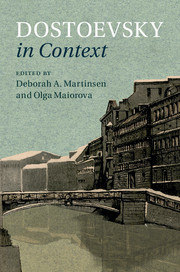Book contents
- Frontmatter
- Contents
- List of illustrations
- Notes on contributors
- Acknowledgments
- Note on citation, transliteration, glossary, and dates
- Chronology
- 1 Introduction: the many worlds of Dostoevsky
- PART I SOCIAL, HISTORICAL, AND CULTURAL CONTEXTS
- i CHANGING POLITICAL, ECONOMIC, AND SOCIAL LANDSCAPE
- ii POLITICAL, SOCIAL, AND CULTURAL INSTITUTIONS
- iii SPACE AND PLACE
- iv RELIGION AND MODERNITY
- 21 Orthodox spirituality
- 22 Religious dissent
- 23 Roman Catholicism
- 24 Islam
- PART II LITERATURE, JOURNALISM, AND LANGUAGES
- Glossary
- Further reading
- Index
- References
24 - Islam
from iv - RELIGION AND MODERNITY
Published online by Cambridge University Press: 18 December 2015
- Frontmatter
- Contents
- List of illustrations
- Notes on contributors
- Acknowledgments
- Note on citation, transliteration, glossary, and dates
- Chronology
- 1 Introduction: the many worlds of Dostoevsky
- PART I SOCIAL, HISTORICAL, AND CULTURAL CONTEXTS
- i CHANGING POLITICAL, ECONOMIC, AND SOCIAL LANDSCAPE
- ii POLITICAL, SOCIAL, AND CULTURAL INSTITUTIONS
- iii SPACE AND PLACE
- iv RELIGION AND MODERNITY
- 21 Orthodox spirituality
- 22 Religious dissent
- 23 Roman Catholicism
- 24 Islam
- PART II LITERATURE, JOURNALISM, AND LANGUAGES
- Glossary
- Further reading
- Index
- References
Summary
No well-educated nineteenth-century Russian was unaware of the enormous role of Islam and Muslim peoples in the empire's history. The topic figured prominently in poetry and fiction on Russia's half-century war to conquer the largely Muslim-populated Caucasus mountains, yet Dostoevsky lacked the personal experience in the region that inspired highbrow writers such as Alexander Pushkin, Mikhail Lermontov, and Leo Tolstoy, and he openly disdained the use of Muslim subject matter in lowbrow genres to pander to public demand for exotic adventurism. No single work of Dostoevsky's, with the possible exception of the Diary of a Writer, is widely remembered for its relevance to the Muslim world, but scattered references to that religion and its adherents throughout his work show that Islam was a significant part of the world Dostoevsky knew. Over his life and career Dostoevsky occupied no simple, fixed position on Islam. In his inconsistencies, rather, he epitomized some core ambiguities and paradoxes of Russia's, and Europe's, perspective on it.
Geographically, Kievan Rus’ (882–1238) was positioned to absorb the religion of its steppe neighbors, but even though Grand Prince Vladimir welcomed an envoy from Volga Bulgaria to tell him about Islam, he ultimately opted to impose Christianity on his domain in the tenth century. The Golden Horde, which from the thirteenth to the fifteenth centuries collected tribute from Russia and kept it culturally isolated, converted to Islam during that time yet did not force the religion on its Slavic subjects. After years of Mongol subjugation, much of Muscovite, and then Russian, expansion, beginning with the defeat of Kazan in 1552, was achieved at the territorial and political expense of Islamic states (the Chingissid khanates and the Ottoman and Persian empires). In some cases conquest involved the explicit ambition of replacing Islam with Orthodox Christianity. But even before the empire annexed these lands, individual Muslims (usually aristocrats) might cross into Slavic territory and pledge their loyalty to a Russian prince or tsar, a process that usually required religious conversion but allowed preservation of social status.
By Dostoevsky's time, numerous Russian noble families bore the Russianized names of Muslim-Turkic forebears. Though one of his ancestors, Aslan Chelebi-Мurza, had defected from the Golden Horde to Muscovy in 1389 after being converted to Orthodoxy by Dmitry Donskoi, that lineage was not reflected in Dostoevsky's surname.
- Type
- Chapter
- Information
- Dostoevsky in Context , pp. 209 - 218Publisher: Cambridge University PressPrint publication year: 2016



